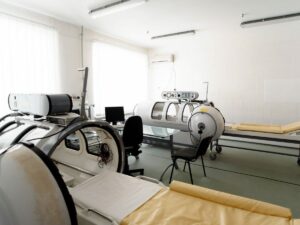Are your clients seeking faster recovery solutions after plastic surgery? Hyperbaric oxygen therapy (HBOT) presents a compelling opportunity to enhance patient outcomes and service offerings.
As an expert in hyperbaric medicine, my extensive experience with HBOT provides valuable insights into its benefits for post-surgical recovery.
Hyperbaric oxygen therapy is not just effective; it’s a game-changer in plastic surgery care. It accelerates healing, reduces swelling, and enhances the overall recovery process after the surgeries.
In this guide, we will discover how hyperbaric oxygen therapy works, its advantages for post-surgical recovery, and practical tips for integrating this therapy into your services.
Read on to explore the benefits today!
Hyperbaric oxygen therapy (HBOT) involves breathing pure oxygen in a pressurized room or chamber. This process significantly increases the oxygen level in the blood and tissues. With the rapid increase of plastic surgery procedures performed by around 19% from 2019, as per the American Society of Plastic Surgeons (ASPS). HBOT is crucial for patients recovering from plastic surgery, as it promotes faster wound healing.
The increased oxygen supply under pressure aids in reducing inflammation and swelling, common post-surgery issues. It also encourages the formation of new blood vessels, a process known as angiogenesis. This isn’t just about healing faster; it’s about pumping more oxygen and nutrients directly to where the body needs it most. Ultimately, HBOT supports the body’s ability to repair itself more efficiently after surgical interventions.

Building on the scientific foundations of HBOT and its role in surgical recovery, this therapy offers multiple benefits specifically tailored for plastic surgery patients. Here are the key advantages:
HBOT speeds up the healing process by increasing oxygen levels in the blood, which speeds up tissue repair. This is especially beneficial after cosmetic surgeries, where quick recovery is desired. You’ll likely notice a big drop in how long it takes to heal. This is a feature that Oxygen-ark proudly supports with its advanced hyperbaric chambers. This faster recovery is a major advantage for patients and clinics aiming for efficiency.
The therapy’s ability to decrease inflammation directly contributes to less swelling post-operation. Here’s the bottom line, reduced swelling enhances comfort and minimizes the risk of complications associated with excessive inflammation. This can lead to a smoother recovery phase and better overall aesthetic outcomes. Patients appreciate this benefit, as it leads to less discomfort and a faster return to daily life.
Patients undergoing HBOT often report lower levels of pain during the recovery period. This therapy reduces the need for pain medications, which can have side effects and lead to dependency issues. Less pain facilitates a more comfortable recovery and may improve the overall patient experience. This makes HBOT an attractive option for managing pain after surgery.
While HBOT offers numerous benefits for plastic surgery recovery, it’s important to recognize its risks and limitations. Here are the primary concerns:
Hyperbaric oxygen therapy can sometimes adversely affect skin grafts or flaps used in plastic surgery. The high oxygen levels, while generally promoting healing, can lead to vasoconstriction, a narrowing of blood vessels. This may reduce blood flow to the newly transplanted tissue, risking the survival of skin grafts. That’s why getting the timing right with the therapy sessions is super important.
While HBOT accelerates initial healing, it can also mask symptoms of infections or other complications in post-surgical wounds. Enhanced oxygenation may improve the surface appearance of wounds while deeper issues remain unresolved. It’s a reminder that while the surface might look good, we need to keep an eye on what’s happening underneath to avoid any surprises later.
The changes in pressure within a hyperbaric chamber can cause rare but serious effects on air-containing body cavities. For example, for patients who have recently undergone facial surgeries or reconstructions, fluctuations in pressure can lead to facial barotrauma or discomfort in sinus areas. It’s crucial to evaluate these risks and prepare appropriate preventive measures before initiating treatment.
Here is a table summarizing the effects of barometric pressure changes within a hyperbaric chamber on air-containing body cavities.
| Condition | Effect of Pressure Change | Potential Risk | Preventive Measure |
| Recent facial surgeries | Increased discomfort or pain | Facial barotrauma | Delay hyperbaric treatment until surgical sites are stable |
| Sinus issues | Aggravation of sinus pressure | Sinus barotrauma | Pre-treatment with nasal decongestants |
| Middle ear conditions | Pressure imbalance, pain | Ear barotrauma | Use of auto-inflation techniques to equalize ear pressure |
| Dental procedures | Sensitivity or pain in treated areas | Dental barotrauma | Ensure proper healing and consultation before treatment |
| Lung abnormalities | Expansion or contraction of air pockets | Pneumothorax, other lung injuries | Thorough medical review and possibly avoiding treatment |
Despite the risks and limitations associated with HBOT in plastic surgery recovery, its benefits often present a compelling alternative to traditional methods. Here are comparisons with some common recovery techniques:

After exploring how HBOT stacks up against traditional recovery methods, it’s evident that it offers unique benefits. Here are some tips to consider when thinking about incorporating HBOT into the post-plastic surgery recovery plan:
Before deciding on HBOT, evaluate if the patient’s health and surgical outcome make them a good candidate. Patients with certain medical conditions may not be suitable for HBOT. Let me guess, you’re thinking about the safety and effectiveness of the treatment for speeding up recovery. This step is crucial in maximizing the benefits of HBOT without compromising health.
When planning HBOT sessions, it’s important to avoid starting too soon after surgery to reduce the risk of specific complications. Optimal timing should be carefully planned in consultation with a specialist who understands both HBOT and the details of the surgical procedure. This way, we make sure we’re lining everything up to get the most out of the therapy sessions without any extra risks.
HBOT is often not covered by insurance when used for plastic surgery recovery, which can make it a more expensive option than traditional recovery methods. Some examples of these costs include the potential reduction in expenses related to other aspects of post-surgical care, like decreased need for pain medication. Evaluating both immediate and long-term financial impacts can help in making a cost-effective decision.
Effective communication between the hyperbaric team and the surgical team is essential for a successful recovery using HBOT. Before beginning therapy, make sure that both teams are aligned with the patient’s recovery goals. This coordination helps in customizing the HBOT protocol to complement the surgical care plan effectively, a process where Oxygen-ark plays a critical role with its specialized equipment and expertise.
Hyperbaric Oxygen Therapy (HBOT) is transforming the way patients recover from plastic surgery. This guide provides crucial insights on how to effectively integrate hyperbaric oxygen therapy into your patient’s post-surgical recovery plan.
If your business is interested in exploring more the benefits of hyperbaric oxygen therapy, Oxygen-ark is ready to help you. Feel free to contact us to discover how we can enhance your client’s recovery experiences.
Get in touch with us and unlock your full well-being potential!
The OxygenArk team is here to assist you every step of the way.